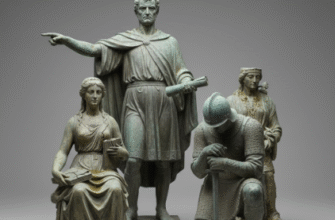The world we live in, with its complex political systems, scientific methods, and deep-seated beliefs about individual freedom, wasn’t born overnight. It was forged in the crucible of intellectual debate by thinkers who dared to question everything. They dismantled old certainties and laid the foundations for modern Western thought, creating the very language we use to discuss concepts like rights, reason, and reality. To understand our present, we must journey back and meet the minds that shaped it.
The Architects of the Modern Mind
While countless figures contributed to this monumental shift, a handful of philosophers stand out for their profound and lasting impact. They didn’t just offer new answers; they fundamentally changed the questions we ask. From the nature of existence to the ideal form of government, their ideas sparked revolutions, both on the battlefield and within the human mind itself. Let’s explore some of these pivotal thinkers and the revolutionary concepts they introduced to the world.
René Descartes: The Father of Doubt
In the early 17th century, a French philosopher named
René Descartes embarked on a radical project: to doubt everything that could possibly be doubted. He questioned the evidence of his senses, the teachings he had received, and even the reality of the physical world. He wanted to find one single, irrefutable truth upon which he could build a new system of knowledge. After stripping everything away, he was left with a powerful realization: even if he was doubting, there had to be a “he” doing the doubting. This led to his famous declaration,
“Cogito, ergo sum” –
“I think, therefore I am.”
This wasn’t just a clever phrase. It marked a monumental shift in philosophy. For centuries, truth had been anchored in external authorities like God or the Church. Descartes relocated the foundation of certainty to the individual’s consciousness. This introspective turn gave birth to modern rationalism, the idea that reason is the chief source and test of knowledge. His work championed a methodical, logical approach to inquiry that heavily influenced the scientific method and set the stage for the Enlightenment’s celebration of human reason.
John Locke: The Champion of Liberty and the Blank Slate
If Descartes focused on the inner world of the mind, the English philosopher
John Locke turned his attention to how that mind is shaped by the external world. He famously rejected the idea that we are born with innate knowledge. Instead, he proposed that the human mind at birth is a
“tabula rasa,” or a
blank slate. Everything we know, all our ideas and beliefs, comes from experience – what we see, hear, taste, and touch. This idea, known as empiricism, became a cornerstone of modern psychology and science, emphasizing observation and evidence over abstract reasoning alone.
Locke’s influence, however, extends far beyond the theory of knowledge. He is arguably one of the most important political philosophers in history. He argued that all individuals are born with natural rights, which he identified as
life, liberty, and property. He contended that governments are formed through a social contract, not by divine right, and their primary purpose is to protect these fundamental rights. If a government fails to do so, the people have the right to alter or abolish it. These ideas were nothing short of revolutionary and directly fueled the American and French Revolutions.
John Locke’s influence on American political thought is undeniable and well-documented. Thomas Jefferson drew heavily on Locke’s “Second Treatise of Government” when drafting the Declaration of Independence. The famous phrase “Life, Liberty and the pursuit of Happiness” is a direct echo of Locke’s formulation of natural rights. This connection illustrates a clear line from philosophical theory to the founding principles of a nation.
Immanuel Kant: The Great Synthesizer
For a long time, philosophy was divided into two camps: the rationalists who followed Descartes, and the empiricists who followed Locke. It was the German philosopher
Immanuel Kant who bridged this gap in the late 18th century with a breathtakingly original system of thought. Kant agreed with the empiricists that all our knowledge begins with experience. However, he argued that our minds are not passive blank slates; they are active participants in shaping our reality.
He proposed that our minds come equipped with certain innate structures—like concepts of space, time, and causality—that organize the raw data we receive from our senses. It’s like wearing a pair of blue-tinted glasses; you can’t see the world without them, so everything you perceive is tinted blue. For Kant, we can never know things “as they are in themselves” (the noumenal world), only things “as they appear to us” (the phenomenal world), structured by our own minds. This “Copernican Revolution” in philosophy had a profound impact, shaping everything from science to art. Furthermore, in ethics, Kant introduced the
Categorical Imperative, a moral law that dictates we should act only according to principles that we could will to be universal laws for everyone, placing morality firmly on the foundation of reason.
Jean-Jacques Rousseau: The Radical Believer in the General Will
A contemporary of the Enlightenment,
Jean-Jacques Rousseau was also one of its sharpest critics. While many of his peers celebrated progress, reason, and civilization, Rousseau argued that these forces had corrupted humanity’s natural goodness. He famously wrote, “Man is born free, and everywhere he is in chains.” He idealized a “state of nature” where humans were “noble savages,” independent and compassionate.
His most influential work, “The Social Contract,” re-imagined the source of political authority. For Rousseau, a legitimate state is one guided by the
“general will” – the collective interest of all its citizens, rather than the sum of individual desires. True freedom, he argued, was not doing whatever you wanted, but obeying a law that you have prescribed for yourself as part of the community. This radical idea of popular sovereignty and collective self-governance became a rallying cry for the French Revolution and has inspired both democratic and, controversially, totalitarian movements ever since.
Friedrich Nietzsche: The Prophet of the Übermensch
Jumping forward to the late 19th century, we encounter
Friedrich Nietzsche, a philosopher who took a hammer to the foundations of Western thought. With blistering prose and powerful aphorisms, he challenged the core tenets of Christianity, morality, and philosophy itself. His most famous and often misunderstood declaration is that
“God is dead.” He didn’t mean this as a triumphant shout of atheism, but as a cultural observation: the belief in a divine order that gave life meaning and underpinned morality was collapsing.
In the face of this nihilism—the void of meaning left by God’s death—Nietzsche challenged humanity to become creators of new values. He proposed the ideal of the
“Übermensch” (often translated as “Overman” or “Superman”), a being who overcomes human limitations, rejects traditional “herd morality,” and creates their own life-affirming purpose. Nietzsche’s work on the will to power, perspective, and his critique of truth itself would prove to be enormously influential on 20th-century existentialism and postmodernism, forcing us to confront uncomfortable questions about where we find meaning in a seemingly meaningless universe.









